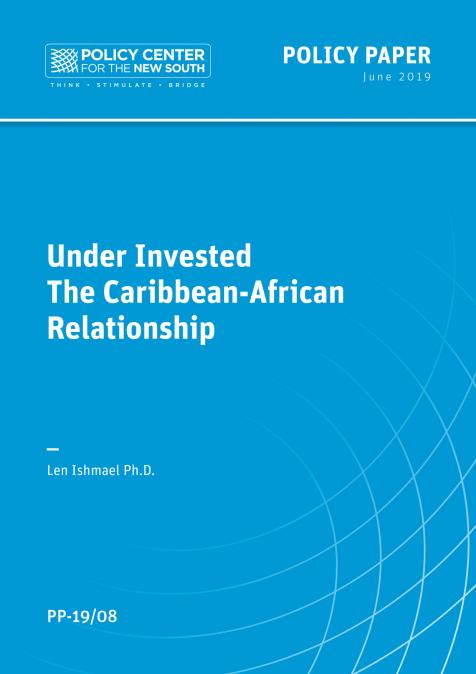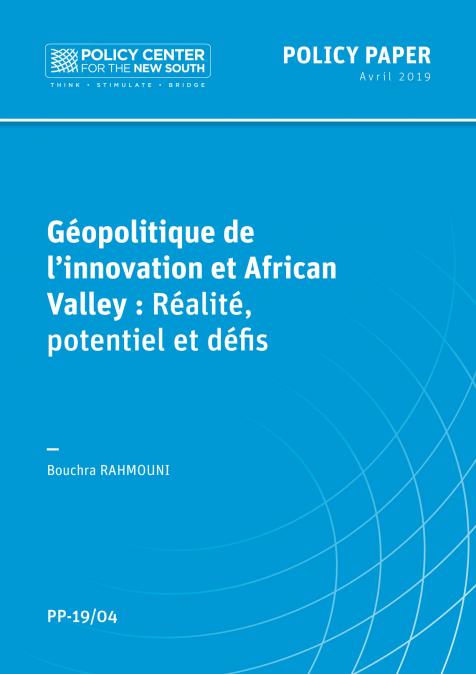Publications /
Opinion
Abdelhak Bassou is one of the leading national and African security experts. He is a Senior Fellow at the Policy Center for the New South and a highly appreciated professor at the elite University Mohammed VI, near Marrakech. His opinions provoke thoughts and comments, just as they should. The Policy Center for the New South’s Annual Report on Africa’s Geopolitics, coordinated by Mr. Bassou, contains numerous reports on the damaging effects of COVID-19 on Africa’s societies: ‘Impact of COVID-19 on Governance for the Peace and Security of Africa’;‘COVID-19: A Perfect Storm of African Securities’ or ’Covid 19, un révélateur des maux des sociétés africaines’, and ‘L’Afrique entre deux pandémies: la Covid-19 et la famine’. In his foreword to the report, Bassou nevertheless makes it clear that “the current edition opted to stand out from a certain form of media coverage which, by focusing on COVID-19 in Africa, has neglected other main issues on the continent and has therefore undermined efforts to address them”.
There had been “a widespread expectation of a bleak, if not disastrous, outlook for Africa” from COVID-19, Bassou wrote. The foreign media had predicted Africa would drown in an ocean of tears, sweeping away whatever progress had been achieved. “But the disastrous outlook, the anticipated cataclysm has not occurred, yet”, wrote the national security expert. By the end of 2020, Africa had reported a total 64,790 confirmed deaths, and 2,280,488 recoveries for2,728,602 registered cases. “While certainly distressing,” stated Mr. Bassou, “these figures are not overly alarming compared to statistics from other continents”. Brazil had reported more than half a million COVID-19 deaths by July 2021, the US more than 620,000, India 405,000, Mexico 234,000. France and Italy more than 100,000 and no end in sight. “One can hardly dispute the fact that the pandemic was less severe in Africa than elsewhere”, Bassou wrote. “Nevertheless COVID-19 is repeatedly invoked as the cause of all set backs throughout 2020”.
But, asked Bassou, “was it really the root of all evil [or]is the pandemic used to hide other pathologies troubling the continent?” His answer, reduced to the headline of his African Panorama 2020:“All is not COVID-19’s fault”. Bassou asked:“has COVID-19 diverted states or armed groups from their goals: fighting terrorism for the former, and destabilizing the established order for the latter? Has COVID-19 been the main priority, diverting attention from the security goals pursued before the pandemic? The author answers/” This has not been the case. Each side hoped the pandemic would weaken the other, and the armed groups got their wish”. A Sahel Citizen Coalition report, quoted by M. Bassou, noted that for war and terrorism casualties, “2020 was the deadliest year for civilians, with nearly 2,440 deaths in Burkina Faso, Mali and Niger…Nearly two million peoplehave fled their homesbecause the violencein these central Sahel countries…Sixty percentof the displaced are childrenand an estimated 13 milliongirls and boys are out of school”. The Sahel report, compiled in the midst of the pandemic does not attribute the 2020 deterioration to COVID-19, Bassou explained, “but rather to both the nature of the response and more importantly, to the rigid stakeholder focus on military solutions”.
‘Concealing the Real Failings’
Terrorism “has changed little or nothing,” Bassou insists. In his study, he confirms “the same is true for the Lake Chad Basin”, another epicenter of violence of transnational proportions, communal wars, broken ceasefires, shifting frontlines, jihadist campaigns andmassacres. “Terrorism remains a threat that the health crisishas neither concealed nor transformed, despite COVID-19 being used as a pretext to justify a number of shortcomings. From the terrorists’ perspective, the pandemicprovides a propaganda argumentto incite populations against government failures. But these failureshave long been plentiful, well before COVID-19”.
Mr. Bassou also suggests that the pandemic has not disrupted electoral processes, which are “notoriously difficult in Africa”. More than 22 elections were scheduled in Africa in 2020, but only a few, including state council votes in Ethiopia, and its parliamentary elections scheduled for August, and legislative elections in Chad, were cancelled, as wasa parliamentary vote in Somalia in November. Part of the good news: Algeria held a constitutional referendum and Burkina Faso, regularly confronted by terrorism, held general elections, despiteviolence. “While COVID-19 is often used as pretext”, noted Abdelhak Bassou in his Policy Center paper, “all observers agree that the causes of delay lay beyond the pandemic. It is also not the pandemic that has caused the mismanagement of African resources, which, despite their abundance, fail to lift large segments of the population out of poverty”. The national security expert suggested that “functional failure of some states is not the result of COVID-19, but the result of long standing practices prevalent in a number of countries, where the state as an institution fails to perform its function throughout its territory, while populations of neglected areas consequently fall prey to armed groups and transnational criminal organizations. The pandemic is irrelevant in determining the root causes of the emergence of grey areas, escaping government control”.
Corruption comes to mind, practiced in a number of African countries, corruption not created by the virus, as Bassou reminds us: “This evil was already eating away at the continent’s countries—including its two major economies—well before the arrival of COVID-19”. The coordinator of the Annual Report on Africa’s Geopolitics uses an overall metaphorical picture of Africa, a figurative scene showing a haze darkeningthe sky over the continent: “The cloud is COVID-19. It however does not obscure the clear perception of all hazards facing the continent. Terrorism and violence fueled by transhumance, socio-political crises, social inequality, and other crisis of governance, continue to be the real flaws and challenges in Africa, despite attempts to utilizethe pandemic and place itat the forefront to conceal the real failings”.






